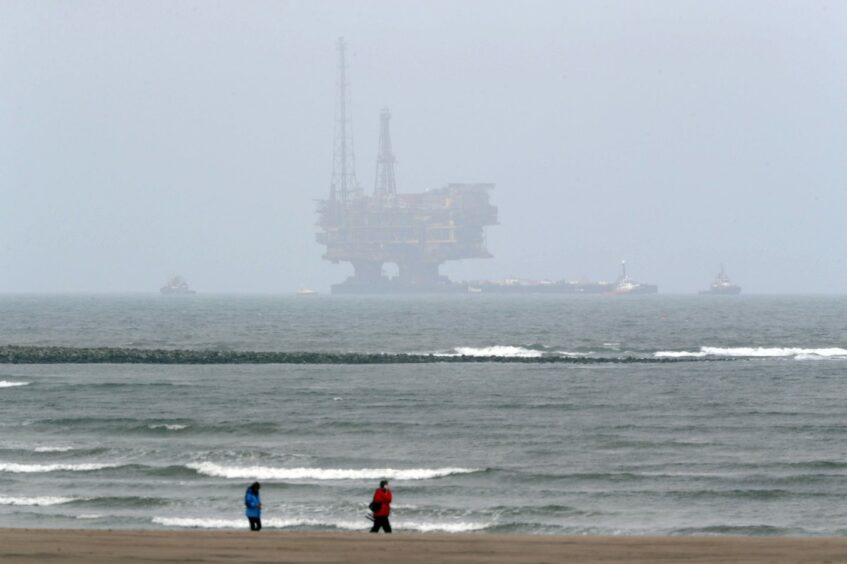
The UK has seen large-scale decommissioning work go overseas, OEUK’s decommissioning manager Ricky Thomson says firms need to remain “competitive” to win contracts for these “monster platforms.”
Offshore Energy UK’s decommissioning manager added that the belief that the UK is missing out on work is a “misconception”.
Last year Energy Voice found that British yards had won dismantling for 26 of the 39 oil and gas assets removed from the UK North Sea between 2018-2021.
That included a series of heavy, high-value assets like the Brent and Ninian platforms, alongside smaller prizes like the dozen V-field assets from Harbour Energy’s Southern North Sea portfolio.
The North Sea Transition Authority (NSTA) estimated in August that 150-200 wells will be fully decommissioned each year over the next five years, at an annual spend of £700m – £1bn.
Earlier this year, the NSTA bumped up its estimated bill for cleaning up the UK basin from £37 billion to £40bn.
The offshore regulator said that the increase was down to heightened demand for equipment, vessels and services from other regions and sectors, like offshore wind, which has pushed up prices.
When asked about the big-ticket items that will be coming up for grabs, Mr Thomson said: “Talking about the monster platforms, northern and central North Sea, our infrastructure here can take it for the most part.”
He added: “We need to make sure that we’re competitive and there is a couple of things we can do, potentially in that area, we need to figure out why some of the larger projects have gone overseas.”
The trade body’s decommissioning manager questioned “is it cost is it other reasons?”
One factor that may be standing in the way for UK firms is the lack of heavy lift vessels in the country’s waters, Mr Thomson suggested.
OEUK’s decommissioning manager said: “Obviously, those vessels come from elsewhere in Europe, and they’re tied in with relationships with yards, which are overseas.
“I think there’s an opportunity for us to build some of those relationships here and try to push a little bit harder in that area.
“Some of the infrastructure that’s been newly built, we’re going to have some first time projects, but we have brought some big stuff over here.
“So, there is an opportunity, and we just need to work together across the industry to make sure that, one, can actually do the work, which I think will be a yes, and two, that we’re competitive in that area across the board.”
For the OEUK decommissioning boss, the most important thing businesses in the UK can do to bring major decommissioning work to yards across the country is “win the contest” and one way that can happen is if the price of decommissioning in the UK is lowered.
He added: “We need to be competitive the operators are always keen to give the project to the UK but also to the most competitive.
Mr Thomson explained: “With pressure on prices, on inflation, on taxes on energy profit level and all these things, we have to lower the price of decommissioning, which is what we’ve been trying to do.”
The UK has seen some large-scale decommissioning work bring platforms to domestic yards in the past, this is something that is “good to see,” says Mr Thomson, especially for the jobs that this work creates.
The OEUK decommissioning boss told Energy Voice: “We can do that in the UK, and we can be competitive with those overseas yards.
“Remember, onshore smatterings are a reasonably small part of the overall prize in the UK, but like everyone else in the UK, I’d love to see those monster platforms.
“Some of them have, quite a lot of them have actually, if you look historically come to UK shores, it’s good to see it’s good to see them structure coming here. It’s good to see jobs via that.”
There is often pessimism around the work decommissioning contracts that UK firms have lost it on to their overseas counterparts, however, Ricky Thomson says that this is not the right outlook to have.
OEUK’s decommissioning manager said: “It’s often looked at from what is not happening, and I think it should be looked at from the perspective of what is happening.
“If you look at the OEUK work breakdown structure, which goes through all 11 elements of a decommissioning project, the supply chain and operator space within each of those elements is extremely strong.”
Mr Thomson explained the pessimism does not “paint the right picture”, that being said, he does admit that there is “always room for improvement.”
He explained: “A few highlighted projects that don’t come to our shores, I don’t think the paints the right picture of how well we’re doing, but we could always do better, there’s always room for improvement.
“The big numbers that that we’re going to be throwing in next month’s St Andrew’s conference and in the Insight report that’s come this month as well, you want to see as much as possible come to UK shores.”

